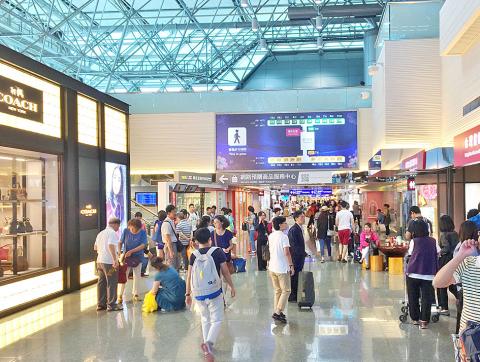People going abroad during the Lunar New Year holiday are advised to arrive at Taiwan Taoyuan International Airport three hours earlier than their departure time due to the seasonal increase in travelers, Taoyuan International Airport Corp (TIAC) said yesterday.
The company estimates that the number of travelers accessing the airport during the nine-day holiday would exceed 150,000 per day, while the total passenger volume would rise by about 6 percent compared with the holiday period last year.
The busiest day would be on Sunday next week, the last day of the holiday, when the airport is to accommodate 785 flights, it said.

Photo: Wang Meng-lun, Taipei Times
Several Taiwanese airlines have announced that their counters would open early.
Low-cost carrier Tigerair Taiwan (台灣虎航) said that travelers boarding flights between Saturday and Friday next week should start checking their luggage three hours before departure.
China Airlines (華航) said it would give passengers 500 mileage points if they use the company’s online check-in system or self-service check-in machines at the airport to complete preboarding procedures from Friday until Feb. 28.
EVA Airways Corp (長榮航空) and Uni Air (立榮航空) announced that until Feb. 17, counters at the airport would open at 4:15am, while check-in would close 60 minutes before departure, rather than 40 minutes.
The airlines also advised passengers to check in online, adding that they can do so 48 hours to one-and-a-half hours before departure.
Passengers can obtain their boarding passes at self-service machines after they arrive at the airport.
Airport staff would face a tremendous challenge during the holiday due to the increase in flights and enhanced carry-on luggage inspection to prevent the spread of African swine fever, Deputy Minister of Transportation and Communications Chi Wen-chung (祁文中) said during an inspection at the airport.
Officials from customs, the Civil Aeronautics Administration and the Bureau of Animal and Plant Health Inspection and Quarantine are charged with airport control and would do their best to contain the disease, Chi added.
Several major projects to expand airport capacity are to finish or begin this year, TIAC said.
Terminals 1 and 2 have a combined capacity of 32 million passengers per year, but passenger volume rose by 3.69 percent to 46.53 million last year, the company said.
TIAC statistics showed that the airport’s cargo volume increased by 2.3 percent to 2.32 million, while the number of aircraft accessing the airport rose by 4 percent to 256,069.
Eleven regular flight services were last year added to the airport’s operations, including to Brunei, Ontario International Airport in California and Cheongju International Airport in South Korea.
The Terminal 2 expansion project is to finish in the first half of this year and increase the terminal’s capacity by 5 million passengers per year, while construction of Terminal 3 is scheduled to begin in September and finish by 2023.
New two-way taxiways that could accommodate two Airbus 380 aircraft simultaneously are to begin trial operations before the end of this year, the company said.

MAKING WAVES: China’s maritime militia could become a nontraditional threat in war, clogging up shipping lanes to prevent US or Japanese intervention, a report said About 1,900 Chinese ships flying flags of convenience and fishing vessels that participated in China’s military exercises around Taiwan last month and in January last year have been listed for monitoring, Coast Guard Administration (CGA) Deputy Director-General Hsieh Ching-chin (謝慶欽) said yesterday. Following amendments to the Commercial Port Act (商港法) and the Law of Ships (船舶法) last month, the CGA can designate possible berthing areas or deny ports of call for vessels suspected of loitering around areas where undersea cables can be accessed, Oceans Affairs Council Minister Kuan Bi-ling (管碧玲) said. The list of suspected ships, originally 300, had risen to about

DAREDEVIL: Honnold said it had always been a dream of his to climb Taipei 101, while a Netflix producer said the skyscraper was ‘a real icon of this country’ US climber Alex Honnold yesterday took on Taiwan’s tallest building, becoming the first person to scale Taipei 101 without a rope, harness or safety net. Hundreds of spectators gathered at the base of the 101-story skyscraper to watch Honnold, 40, embark on his daredevil feat, which was also broadcast live on Netflix. Dressed in a red T-shirt and yellow custom-made climbing shoes, Honnold swiftly moved up the southeast face of the glass and steel building. At one point, he stepped onto a platform midway up to wave down at fans and onlookers who were taking photos. People watching from inside

Japan’s strategic alliance with the US would collapse if Tokyo were to turn away from a conflict in Taiwan, Japanese Prime Minister Sanae Takaichi said yesterday, but distanced herself from previous comments that suggested a possible military response in such an event. Takaichi expressed her latest views on a nationally broadcast TV program late on Monday, where an opposition party leader criticized her for igniting tensions with China with the earlier remarks. Ties between Japan and China have sunk to the worst level in years after Takaichi said in November that a hypothetical Chinese attack on Taiwan could bring about a Japanese

STREAMLINED: The dedicated funding would allow the US to transfer equipment to Taiwan when needed and order upgraded replacements for stockpiles, a source said The US House of Representatives on Thursday passed a defense appropriations bill totaling US$838.7 billion, of which US$1 billion is to be allocated to reinforcing security cooperation with Taiwan and US$150 million to replace defense articles provided to the nation. These are part of the Consolidated Appropriation Act, which the US House yesterday passed with 341 votes in favor and 88 against. The act must be passed by the US Senate before Friday next week to avoid another government shutdown. The US House Committee on Appropriations on Monday unveiled the act, saying that it allocates US$1 billion for the Taiwan Security Cooperation Initiative